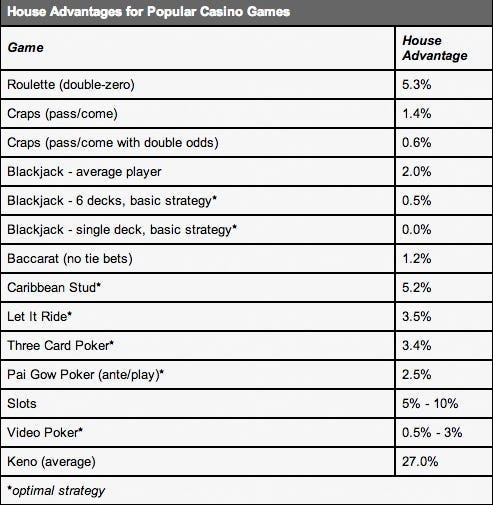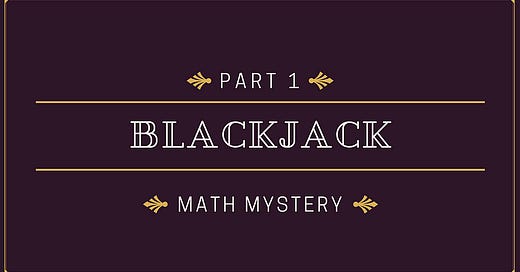Blackjack Math Mystery 1: Can the game make you a millionaire?
Why you should play blackjack and how casinos do it that they always win in the end?
Why you should play blackjack and how casinos do it that they always win in the end?
Welcome, fellow gamblers! Let me take you on a journey through the fascinating, yet simple card game called blackjack. One of the most widely played games across the world casinos.
When I say to someone that I play blackjack, people most often mention the movie “21.” (Or tell me I am a big nerd). In the movie, a group of MIT students put a team having playing blackjack with a strategy so good that they beat casinos and their cumulative winnings amount to millions.
Although the details are certainly exaggerated, such team really existed and was active for almost 20 years in 80s and 90s. They really won millions.

So what was the secret?
Luck?
Dirty tricks?
Advanced math?
Actually, it was quite easy mathematics which everyone can learn and use to win millions too. There are tons of resources telling you “Memorize these three tables” and giving tricks on the blackjack strategy.
In this article, I will first of all explain WHY it is possible to beat casinos in this game, even if casinos do anything to make you lose money. If you want to start from the basics, or if you already know blackjack, but are still skeptical that the math is really mathing, this is for you.
Blackjack is unique in two things, the second being a consequence of the first.
Blackjack has the highest “house edge” out of all casino games.
You can increase your “expected value” in blackjack.
You can translate the two statements above into:
Out of all casino games, blackjack is (as far as I know) the one where you have the best chance to win.
You can make money with blackjack in the long run, if you do right decisions, without relying on luck, cheating or star constellations.
House edge and expected value
If you own a casino, it makes sense that you want to make money, but most importantly, you aim at making them in the long run. That means, even if occasionally a “Florida man wins 300 millions of dollars in jackpot”, if you sum everything the players put into jackpot machines, roulette, etc. and subtract all money you pay them if they win, you still have a positive value. This value is called “expected value” and you will hear this term a lot in statistics. Remember it well if you want to get good at blackjack.
Informally, the expected value is defined as the arithmetic mean of a large number of independently selected outcomes of a random variable.
It´s pretty obvious that casinos aim at having positive (and higher = better) expected value for themselves. However, if the games are about luck, how can you be 100% sure as a casino owner that all people suddenly start winning and you lose your living?
Casinos have this all sorted with a concept called “house edge”. The house edge is the mathematical advantage that the casino has over the players in a particular game. It’s expressed as a percentage, and it represents the expected long-term profit that the casino will make from each bet. For example, if a game has a house edge of 5%, that means that over time, the casino will keep 5% of every bet made by players.
All casino games have positive house edge, meaning they chose games where the math just goes against players in the long run.
What tricks can casinos use to keep a positive house edge (and hence, positive expected value)?
House edge is not increased just by mathematical settings of the games. You can think of the house edge like a sports team playing on their home field. The casino is always in a familiar environment.
For example, in games like roulette, the casino has a built-in advantage because there are 38 slots on the wheel (including the 0 and 00), but the payout for a winning bet on a single number is only 35 to 1. This means that even if a player wins occasionally, the casino will always come out ahead over time.

It is indeed difficult to calculate the exact house edge (it depends on more factors than just rules of the games). However, if you play blackjack well, you can get to almost zero, which is imposible in any of the other games.
Now it´s time to introduce rules of blackjack and (before revealing the strategy to win millions) explain why the house edge is initially (without you playing with any strategy) positive for the casino.
Rules of blackjack
Blackjack is played with 2–7 players and one dealer, using 2–8 standard card decks with 52 cards. Initial deal — the first two cards that are dealt to a player by the dealer at the beginning of the game. Each player at the table, including the dealer, will receive two cards each. The player’s two cards are usually dealt face-up, while one of the dealer’s cards is dealt face-up and the other face-down (known as the “hole” card).
Goal of the whole game is to have a hand value of 21 or as close to 21 as possible without going over. It is played in multiple rounds and in each round, whoever gets closest to 21 wins the round and takes the bets.
The first two cards that are dealt to a player by the dealer at the beginning of the game. Each player at the table, including the dealer, will receive two cards each. The player’s two cards are usually dealt face-up, while one of the dealer’s cards is dealt face-up and the other face-down (known as the “hole” card).
Cards 2–10 are worth their face value, face cards (Jacks, Queens, and Kings) are worth 10, and Aces can be worth 1 or 11.
At the beginning, after everyone places their bet, the dealer deals two cards to each player and two cards to themselves, with one card face up and one face down.
Players can choose to “hit” (take another card) or “stand” (keep their current hand).
Players can also choose to “double down” (double their original bet and receive one more card) or “split” (if they have two cards of the same value, they can split them into two separate hands).
If a player’s hand exceeds 21, they “bust” and automatically lose the game.
Once all players have finished their turns, the dealer reveals their face-down card and must hit (take more cards) until they reach a hand value of at least 17.
If the dealer busts (exceeds 21), all remaining players win. If not, the player with the highest hand value without busting wins.
A “blackjack” is an Ace and any 10-point card, and it beats all other hands.
Advantages given by game rules and setting
Dealer has one of the cards facedown.
The player must act first, which means that they can bust before the dealer even plays their hand
Sometimes casinos use multiple decks of cards — making card counting (and thus using a strategy) more difficult for players.
Casinos may offer lower payout odds for blackjack to decrease the players’ chances of winning
If the player goes over 21 points (known as “bust”), they always lose, even if the dealer also busts, which means that blackjack favors the dealer.
Advantages given by environment
Casinos try to make you lose focus
Dealer plays as quickly as possible to make it difficult to apply any strategy
Regular shuffling prevents players from counting cards effectively and decreases their chances of winning
Some casinos mark their cards to detect cheating by players, which also makes it harder for card counters
The design of the casino floor, including the placement of tables and the use of distractions like flashing lights and loud sounds
To be honest, you don´t have to worry about these tricks until you learn at least basic strategy for blackjack. Which is exactly what we will do in the next article.
Hope you enjoyed this and if you have any comments, let me know!





